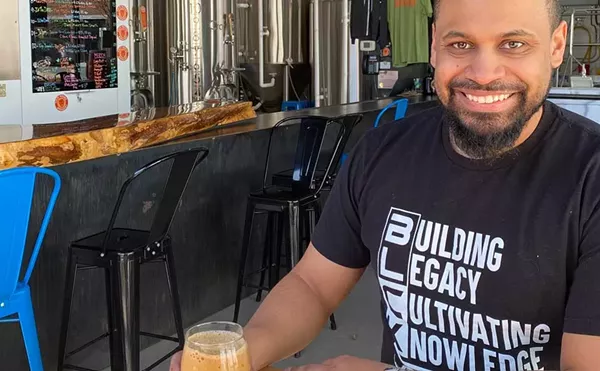At 6 p.m. every Thursday, unless it's too cold outside, 28-year-old Meiko Krishok sets up shop in a lovingly tended old Airstream trailer on Vermont Street between Temple and Spruce streets. On the day we drop by, a gentle snap is in the breeze, but the warm tones of Latin music are radiating from speakers on a table nearby. The leaf-covered lot is set up with a firepit, where a pleasantly warm fire is burning, thanks to Krishok's boyfriend, Kiley Givens. Seated on a few rough-hewn benches surrounding the fire, several people, who've arrived on the dot, are already sampling Krishok's cooking.
It's called Detroit Guerrilla Food, and it has been Krishok's deeply personal project for the past three years. She's been churning out small but interesting dishes, experimenting with flavors from the locality and her family's past, aspiring to make meals that are medicine for a public starved of good, real food.
Food and Family
That this globe-trotting young seeker should find a venue in this bucolic string of lots on Vermont Street is a testament to what Detroit has come to symbolize to many young people: a place with so many official failures that idealists and dreamers find a welcome niche. Krishok grew up in Milwaukee, one of three children born to an Italian-Polish father, a lawyer, from New York and a Korean-born mother, a poet, who immigrated to Hawaii at 5. Her parents had met at school and moved to Wisconsin to follow an opportunity for her father to practice law.
Being in a community without any family nearby, Krishok says she wound up connecting with her past through food, calling it the "central social activity" and something that furnished a tangible link to her culture and heritage.
"I grew up with two really different food traditions from both sides," she says. "My mother's side, obviously, was a lot of Korean food. My father's side was mostly Italian, because my paternal grandma was Italian, and she was the main cook on that side of the family. Maybe because so much of it was coming from my grandmothers, it felt like something filled with love and care, and so I have a lot of pretty vibrant food memories from growing up."
She also got an early crash course in cooking, thanks to a bit of tough-love parenting. With a little laughter, she tells us, "My mom, from a pretty young age, basically forced us to cook dinner for the family once a week from the time I was in third grade. I think a lot of my mom's driving me to cook was not wanting to do everything herself. Some mothers love doing everything for their children, and my mom was never that kind of mother. She was much more like, 'OK, let me get you to be pretty self-sufficient and independent.' I'm also oldest, so I think in some ways I had more responsibilities put on me than, say, my brother, who's the youngest."
The jump-start worked, so much so that, by the time Krishok was in high school, she had taken the small repertoire of food she'd make for her family and started a little catering company, with four different menu items printed on a handout. For a year, she delivered home-cooked meals to customers, mainly her mother's friends.
"Cooking was something I've always done, and mostly in pretty informal ways," she says. "From there, I had cooking jobs, worked at a daycare making vegetarian lunches a couple summers, I've worked at a meditation center, and what i'm doing right now is kind of the first time that I've been my own boss."
Finding Home in Detroit
That journey to being a self-sufficient entrepreneur ranged across the globe, with travels to Belgium, to New York City for school, a semester in the west African country of Mali, a few years teaching English in the French Caribbean country of Martinique, then back to Milwaukee, unsure of what to do next.
"I was searching for something, but didn't know what," she says. "I was on the brink of considering certification and going into teaching when a friend of my mom's convinced me to come to Detroit for a yearlong service program called Cap Corps, one of the programs run by the Capuchins based on east side. They offer a yearlong program where they place you in an organization, nonprofits mostly, and you volunteer full-time. They give you place to live, give small travel and food stipends. So all your basic needs are taken care. It's kind of spiritual in that there's a strong community aspect to it: living with other volunteers and pooling resources and spending lots of time together."
Krishok spent much of that year teaching classes at Detroit's Cristo Rey High School, realizing that she didn't want to be a full-time teacher. She made her decision to go into food full-time, turning a hobby into a business.
About four years ago, Krishok met Greg Willerer, the guy who runs Brother Nature Produce, a Detroit-based farm that provides fresh, organic greens to a number of local restaurants. She worked for him as a "farm hand," and was quickly introduced to Kristyn Koth, one of the trailblazers in Detroit's food truck scene.
"She was there early," Krishok says. "She had to go through a lot of struggle trying to get in compliance with the health department. I mean, they didn't know what to do with her at all. But by the time I met her, her steel-welding business had picked back up and her trailer was being underutilized at that point."
And so, in the spring of 2012, Krishok began preparing simple, healthful meals out of the Airstream trailer Koth had worked so hard to make legit. "At first," Krishok says, "we just wrote a menu on a Post-It Note."
It was around that time that Krishok had heard of calas, the rice-based fritters made by slaves in old New Orleans. She made sweet ones, then was moved to make savory ones, until she realized a tenuous connection to her own food heritage.
"I was calling these calas, but to me they were also like rice balls, and rice balls have a personal significance to me because of fact that i grew up eating them and love them so much. My Italian grandmother would make them, but she would use cheese, butter, and sausage and then coat it in egg and bread crumbs and fry them."
Rice balls remain a staple of what Krishok serves, though over the course of three years, the recipes have changed.
"I don't make sweet ones," she says. "I started using a lot of herbs, I get all those from Greg. I also use a couple Indian spices because they have healing properties, and I really like the flavors they impart. I just recently started reincorporating some of the flavors that come from my grandmother, namely fennel."
Food as Medicine
How have Krishok's menus developed over the last few years? "Within the last year or so, I've put more emphasis on using food for healing, and also because I've been working in that space so long that I'm more comfortable, my food has become a little more complex," she says.
A typical Western diner might draw the wrong inferences from the whole "food as medicine" idea. It's not that a dish or a soup replaces a pill to cure an ailment so much as the idea that whole food builds health holistically. It's something Krishok encountered early on.
"For me, it's deeply personal," Krishok says. "A lot of it comes from what I've been through. When I was a kid, I had allergies, and I think it was due to a combination of foods. From my childhood, essentially, food has been something both really positive and also potentially very dangerous for me, so I think because of that I've developed a consciousness about what it is I'm putting into my body. It made me interested in how it works.
Krishok's mouthwatering small plates certainly don't align with staid ideas of "health food." "It's been mostly vegetarian from the beginning," she says, "but every couple weeks I'll offer some meat." On the day we dined there, the rice balls were fried. Fried food?
"If I were trying to make something extremely clean and really easy on the body," she says, "I would not fry it, from a purist's standpoint. I think the reason I make them is because I realize that most people have fried food in their diet, and this is my alternative to eating something like french fries. I use rice bran oil, a really clean oil in the scheme of things. It's healthier than corn or soy or canola oil. But I also feel like we can enjoy things like that in moderation. These days, I'm more worried about our consumption of sugar than I am about our consumption of fat. You know, eating a couple rice balls once a week is not going to be the end of the world."
Mostly, Krishok tries to stay away from processed foods, which she says makes her feel that her system is clearer, her mood is better, and she has more energy. "What I'm striving to do with all the food I prepare is keep it as close to what it was when it came from the earth as possible."
The results are delicious. She served us a bit of Corridor Sausage Company's apple-sage sausage tucked inside her version of a hot water cornbread biscuit, topped with a green tomato, garlic, and chili salsa, all atop a bed of leafy greens.
The herbs and spices she works into her meals are chosen for flavor and for healing properties. "Cilantro is a really big one," she says. "That has the ability to pull heavy metals out of the body. Fennel is good for digestion. I like to use thyme because you don't have to use as much salt when you use thyme because of how it enhances other flavors. I use a lot of chiles because of their high vitamin C content. I use a lot of garlic because it's antibacterial and antifungal. Spices like cumin aid digestion. Ginger and turmeric are anti-inflammatory.
"I would love to get to the point where it's almost more prescriptive," she says, "but I'm not there right now, partly because of the structure of how I'm serving food to people. I'm doing it for myself and my immediate community, but I would definitely like to see it move more in the direction of becoming even more intentional."
"Green Soup" Recipe
Cook onion in coconut or olive oil over medium-low flame until nice and caramelized.
Add any chopped greens, such as collards, kale, chard, or mustard. A mixture of a few different types is always ideal. Save the stems for broth, as they can make the soup too fibrous.
Allow the greens to cook down a bit and get coated in the oil, then add 1-2 quarts vegetable stock. (You can make a speedy one by boiling a piece of kelp the size of your palm, an onion sliced in half with the skin left on, and a smashed clove or two of garlic. Bring to a boil, then let simmer 20 minutes and strain.)
Let the greens simmer in the broth until soft (not mushy). Blend with an immersion blender or in batches in an upright blender.
Add 1 can full-fat coconut milk, salt and curry powder to taste. Let everything simmer for a minute for all the flavors to blend.
Optional: You can add about 1/4 cup short grain white rice to the greens and stock if you want something slightly thicker.
Detroit Guerrilla Food runs 6-10 p.m. Thursday nights, until it gets too cold, on the 2700 block of Vermont Street in Detroit. See the Facebook page or guerrillafooddetroit.com for more information on Krishok's weekly meals and catering service.






